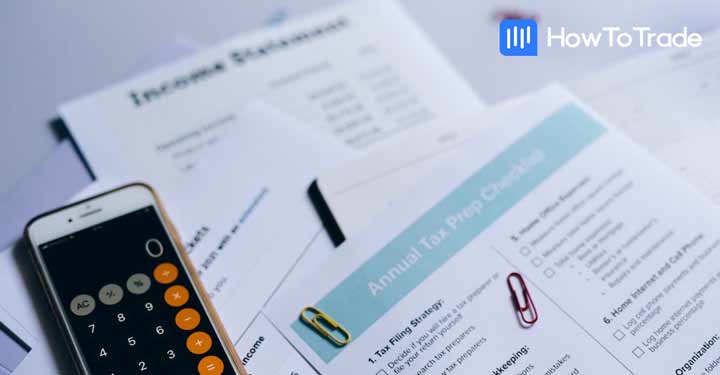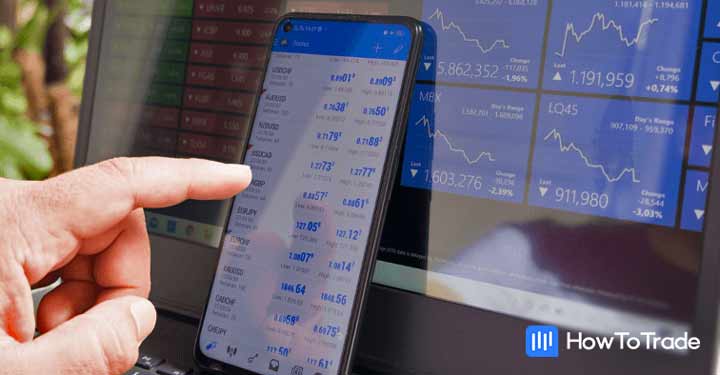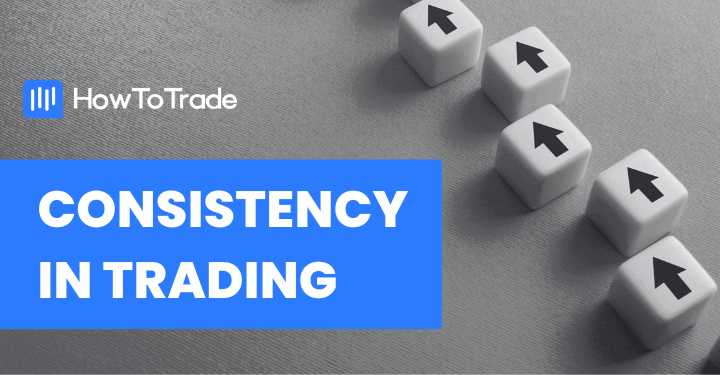
The primary purpose of forex trading is to make as many successful trades as possible and generate income.
This is known as capital gains, which simply means you have sold an asset at a higher value and created a realized profit. But, as you probably already know, when you have an income, you must pay taxes to your government.
In this article, we’ll help you understand how forex taxation works and what is the tax rate you need to pay in your country from capital gains earnings you have made from forex trading.
 Table of Contents
Table of Contents
- Understanding Forex Taxation
- How to Pay Taxes on Capital Gains Made from Forex Trading?
- Forex Trading Taxation in the United States
- Forex Trading Taxation in the United Kingdom
- Forex Trading Taxation in Dubai and the United Arab Emirates
- Forex Trading Taxation in Germany
- Capital Gains Tax Rates in Different Countries
- To Summarize
- FAQs
Understanding Forex Taxation
Like any other income people make, forex traders are subject to taxation on capital gains made from profitable forex trades. A capital gain can be described as any scenario when a trader closes a position at a higher value than initially purchased.
So, for example, if you invest $1000, buy the Euro versus the US dollar, and close the position with a profit of $500, you are required to pay capital gain tax for the $500 profit made from the transaction.
But, as expected, forex trading taxation varies from one country to another. Also, there are additional tax factors to consider when trading forex.
For example, most forex traders lose money, especially at the beginning of their trading career. If so, forex traders can use the losses to offset their annual income. What’s more, the tax rate you need to pay depends on the tax type you inform the authorities about. Those include:
- Individual Income Tax (Personal Income Tax)
- Capital Gains Tax
- Corporation Tax
- Stamp Duty Tax
Each type of tax has its requirements, which means you have to pay a different amount. For that purpose, you must consider the proper taxation based on the scope of your trading activity. For example, if you plan to build a trading career as a forex trader, you will likely report your earnings in the form of individual income tax or corporation tax. Otherwise, if trading is an extra income, you should report your profits as capital gains tax.
Even so, understanding forex taxation is more complex than you might think. Many factors may have an impact on your forex tax liability. As such, you should consult with an accountant in your area to get familiar with forex trading taxation in your country.
How to Pay Taxes on Capital Gains Made from Forex Trading?
Nearly every newbie trader that makes the first steps in forex trading usually asks: do I need to pay tax on forex trading, and how much should I pay for earnings made from forex trading? So, unless you live in a country that does not impose a capital gains tax, you must pay forex taxes to your governmental authorities for profits made in forex trading.
Now, the tax rate you need to pay for capital gains is mostly determined by the local laws in your country. So, with that in mind, let’s briefly review the FX tax systems in some countries.
Forex Trading Taxation in the United States (USA)
The tax system on forex trading gains in the United States is quite complicated. There are many regulations and laws, so knowing the US trading tax mechanism is crucial before you start trading currency pairs.
Essentially, US forex traders have two options – they can file their capital gains taxes under section 988 or section 1256. In the case of section 988, all earnings made from forex trading will be taxed at the same tax rate as the trader’s income tax bracket, which ranges from 0% to a maximum of 37%.
On the other hand, if you choose the file you tax under section 1258, 60% of the earnings will be taxed at a fixed tax rate of 15%, while 40% will be taxed according to the individual’s income bracket.
Typically, traders who fall under the 22% income bracket (or higher) prefer filing their profit taxes through section 1258, while those with lower income will use section 988.
Additionally, it is crucial to understand how forex traders pay tax in the US. The forex tax rate you need to pay in the US depends on the type of trading style you plan to implement, meaning the method in which you trade FX currency pairs and the period for which you plan to hold your positions. This falls under the following categories:
1. Forex Futures and Options Contracts
Forex traders in the US that trade currencies through forex options and futures contracts file taxes under the Internal Revenue Code (IRC) section 1256.
What it means is that your profits will be taxed using the 60/40 rule, so 60% of profits or losses are treated as long-term capital gains and will be taxed at a fixed rate of 15%, while the remaining 40% are treated as short-term gains and will be taxed based on your income bracket.
Naturally, this option is favorable for those traders in high-income brackets as they can reduce their tax burden.
2. Over-the-Counter Spot Market (Exchange)
Forex traders that trade through the OTC market fall under the IRC section 988. The classification of this trading style is short-term trading, as spot market forex transactions are settled within two trading days.
This taxation system is less complicated than section 1256 and simply means that all capital gains and losses are treated as ordinary taxable income. Also, unlike section 1256, which has a cap of the first $3000 to use as ordinary losses, section 988 allows you to count all losses and offset them against your income.
Forex Trading Taxation in the United Kingdom
Fortunately for UK forex traders, filing taxes on forex trading profits is much easier than in the US. The HMRC will determine your tax rate depending on the type of forex trading activities you perform and the asset classification you choose. The options for a UK trader are:
- Spread Betting Account: Forex trading is tax-free for traders who use a spread betting account. However, if choosing this form of trading, forex traders are also not eligible for tax offset claims for their losses made on the spread betting account.
- Forex Trading as an Extra Income: If forex trading is an additional source of revenue for you, then you are covered by the tax-free trading allowance law. This gives you a tax exemption of up to £1,000 in income a year. Any income from forex trading above this amount will be taxed according to income tax rates in the UK (the basic rate is 20%).
- Forex Trading as a Profession: Lastly, forex traders in the UK who trade for a living have to file their income earnings differently. Assuming you are classified as a professional trader in the UK, all profits from forex trading are subject to income tax.
Forex Trading Taxation in Dubai, the United Arab Emirates
Tax laws in Dubai regarding forex trading are entirely different than in many other countries. Dubai is a tax-free country, meaning that capital gains made from Forex Trading are tax-free for UAE residents.
As a result, the popularity of the retail foreign exchange market has significantly increased over the last few years, and many proprietary forex trading firms are operating in the UAE.
Forex Trading Taxation in Germany
Generally speaking, Germany has a business-friendly approach toward forex traders. Compared to other countries, the FX taxation laws in Germany are less complicated and easy to understand.
For those who trade forex as an extra income, German Forex traders are subject to a capital gain tax of 25% in addition to a solidarity surcharge rate of 5.5%. Otherwise, professional forex traders must pay ordinary income tax for the net profit at the end of the year based on their tax brackets.
Capital Gains Tax Rates in Different Countries
Clearly, the vast majority of retail forex traders pay taxes in the form of capital gains. This type of taxation varies from country to country, so you must be alert to the capital gains rate in your country. Below, you can find a list of the maximum capital gains tax rate for some countries.
| Country | Forex Tax Rate |
| United States | 37% |
| United Kingdom | 20% |
| Japan | 20.315% |
| Australia | 23.5% |
| Germany | 25% |
| China | 20% |
| Russia | 13% |
| India | 18% |
| South Africa | 28% |
| Spain | 23% |
| Switzerland, Singapore, Belgium, New Zealand, United Arab Emirates, and Hong-Kong | 0% |
To Summarize
In sum, knowing your forex trading tax liability is crucial if you are planning to trade FX currency pairs. Whether you are planning to build a career as a professional forex trader or trade FX currency pairs as another source of income, it is in your best interest to know the local tax laws of trading in your country.
It’s part of the process of becoming a successful forex trader and often can help you save lots of money if you learn the forex trading taxation laws in your country.
To summarize, here are the key takeaways to keep in mind:
 Key Takeaways
Key Takeaways
- Retail forex traders are subject to taxation on capital gains made from profitable forex trades
- In case you are trading forex as an institutional trader, you will be taxed similarly to any other employee.
- Forex trading taxation varies from one country to another
- The tax rate you need to pay depends on the tax type you inform the authorities about
- For CFDs, you are required to pay a basic tax rate
Frequently Asked Questions (FAQs) About Forex Trading Tax
Here are some of the most frequently asked questions about tax on forex trading.
How can forex trading be tax-free?
Several factors determine whether your forex trading activity can be tax-free or not. First and foremost, it depends on the taxation laws in your country. In most countries, forex traders are taxed on any profit from selling forex capital assets.
However, some countries allow tax-free forex trading. These include the United Arab Emirates, the Bahamas, Brunei, Monaco, the British Virgin Islands, Oman, Turks and Caicos, and Vanuatu.
The second factor in determining the tax liability on forex trading profits is the type of instrument you choose, meaning buying and selling currency pairs directly in the foreign exchange or via derivative products. For example, if you are spread betting, you are not required to pay any tax on capital gains.
However, you will have to pay the basic tax rate on your capital gains for CFDs, options, futures contracts, or foreign currency transactions made in the interbank forex markets.
How to file taxes as a Forex trader?
Obviously, that depends on your country of residence. Practically, you can file taxes as a forex trader on your own, or do it with the assistance of an accountant. In case you are trading forex as an institutional trader, you will be taxed similarly to any other employee. However, in case you are trading FX currency pairs as a retail Forex trader, you will need to file taxes and report your profits and losses.
How to legally avoid paying taxes on forex trading?
Generally, forex traders who do not live in a tax-free country must pay taxes on profits from forex trading. So, you clearly can not (and do not want to) avoid paying taxes on forex capital gains. But, like any other income, there are ways to reduce the tax burden when making profits in forex trading. For that purpose, you should consult with financial advisors in your area to explore ways to reduce the tax rates on your capital gains.
Which countries do not have a tax on capital gains?
Some countries do not impose capital gains tax on forex trading to attract overseas investors and increase retail forex trading activity. Some of these countries, like the Cayman Islands, Barbados, and Malaysia, may be considered tax havens for large-scale investors and typically have fewer regulations regarding forex trading. At the same time, other countries that are considered safer and have more regulatory frameworks may apply the zero capital gains tax for different reasons. These include Switzerland, Singapore, New Zealand, Belgium, and Hong Kong.
Risk Disclosure: The information provided in this article is not intended to give financial advice, recommend investments, guarantee profits, or shield you from losses. Our content is only for informational purposes and to help you understand the risks and complexity of these markets by providing objective analysis. Before trading, carefully consider your experience, financial goals, and risk tolerance. Trading involves significant potential for financial loss and isn't suitable for everyone.





